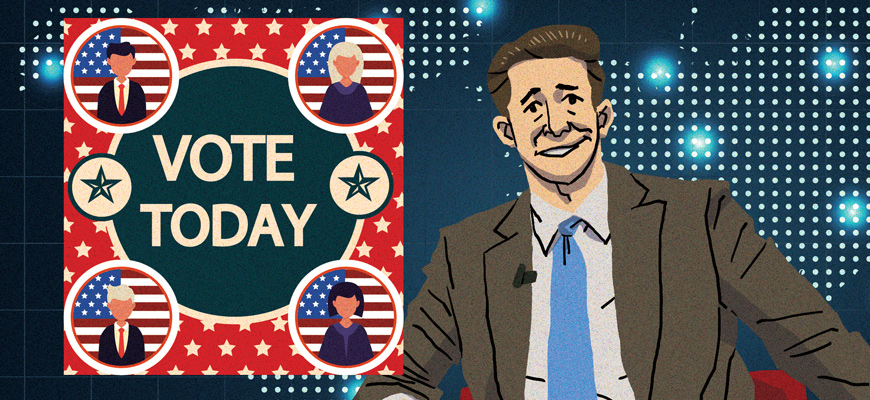
Civics 101: Satire and politics
Journalism professor looks at how satire TV news shows may be driving increased voter participation
Posted on: October 14, 2021; Updated on: October 14, 2021
By Page Ivey, pivey@mailbox.sc.edu, 803-777-3085
Civic engagement is essential to the pursuit of an equitable and prosperous society — and civic responsibility is a cornerstone of higher education, especially at the University of South Carolina.
Whether it’s a journalism professor studying political engagement, a criminal justice professor mentoring future mentors, a business professor inviting an undergraduate into his research on community spread of COVID , UofSC faculty affect the greater community year-round, round the clock and in ways you might never imagine.
Political satire — particularly TV shows in that genre — may be a gateway to civic engagement. Satire may also do more to foster engagement than traditional late-night talk shows, says assistant professor of journalism and self-described “news junkie” Jacob Long.
“One of the first things you learn when studying American politics is that most Americans are not very interested in politics,” Long says. “We've seen a surge in interest in politics beginning with the 2016 election, but some of the basic facts remain the same: Most people aren't spending a lot of time with traditional news sources.”
So Long, who has degrees in political science and communication, looked at other ways of consuming political news, particularly through entertainment shows, such as The Daily Show, with Jon Stewart or Trevor Noah, and Saturday Night Live.
I was intrigued by the idea that media could be both entertaining and promote civic values like participation in the system.
Jacob Long, assistant professor of journalism
He also looked at late-night talk shows, which have become more politically oriented the past five or so years. Study participants were asked about which shows they had watched and about their level of political participation, including attending a rally or speech, donating to a campaign, or displaying campaign yard signs or bumper stickers.
What he found was the satire shows, the ones that some worried would make people less likely to learn more about politics, were in fact the ones that drove increased political participation.
“By the time I started doing research, there were already many signs that these programs were not harmful as some had feared. But I was intrigued by the idea that media could be both entertaining and promote civic values like participation in the system,” Long says.
The Pew Research Center, a nonpartisan information organization, reported than more than 158 million ballots were cast in the 2020 presidential election — almost two-thirds of estimated eligible voters. That is the highest rate of turnout since at least 1980, which is the earliest year in the Pew Center’s analysis.
While his research shows an increase in information seeking among those watching the satire shows, there is no indication about whether the programs themselves change anyone’s political opinions.
“It does show that when politics are an explicit part of entertainment, that can push people to seek more information from traditional sources and also make them feel more like they have the tools to participate in our democratic processes,” he says. “I also suspect the way politics seems to have creeped into more spheres of our lives may be a big part of the reason for the unprecedented level of interest in the 2020 election.”
Share this Story! Let friends in your social network know what you are reading about